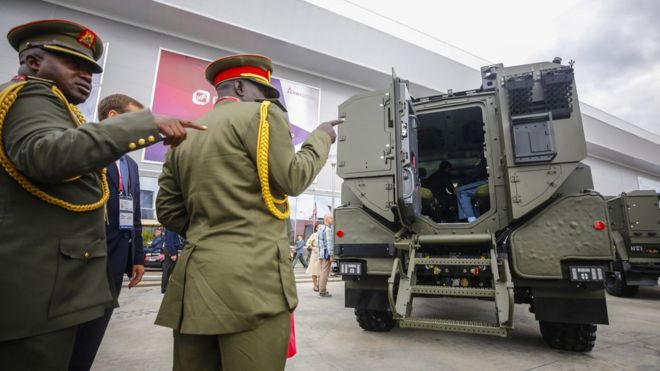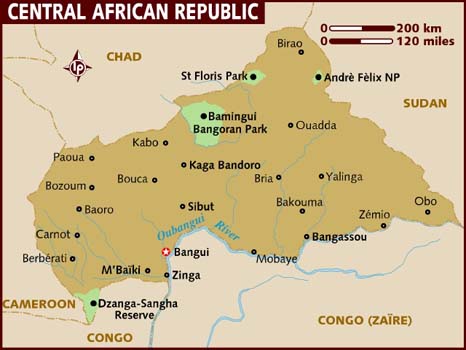Russia’s growing influence in Africa
January 10, 2019 | Expert Insights

Russia's recent activities in Sudan and the Central African Republic have been the subject of intense speculation.
Along with renewed economic ties, private Russian military contractors are reported to have been active in both countries.
Background
The Central African Republic, which got independence from France in 1960, has always been plagued by violence. The francophone country with 4.6 million people has been ravaged by conflict since its independence, having been governed by warlords, autocratic rulers and even a would-be monarchy.
Despite its significant mineral deposits and other resources, such as uranium reserves, crude oil, gold, diamonds, cobalt, lumber, and hydropower, as well as significant quantities of arable land, the Central African Republic is among the ten poorest countries in the world, with the lowest GDP per capita at purchasing power parity in the world as of 2017.
Russia has made the Central Africa Republic a base of operations for a more intrusive diplomatic operation on the African continent. It lacks the financial muscle of China and the diplomatic goodwill of the US but Moscow has been garnering influence over the continent in conflict-torn, unstable mineral-rich countries like CAR.

Analysis
Amid this tense atmosphere, there have accusations by some demonstrators and in the media that Russian contractors have been helping or advising the Sudanese security forces. In the neighbouring Central African Republic (CAR), Moscow has been boosting its official security relations with the embattled UN-backed government there. But speculation about the extent of Russian activity in the CAR grew last July, after the deaths of three Russian journalists, who went there to investigate reports of mercenary activity.
Russian officials have recently played down reports of a large-scale mercenary presence in the CAR. However, some analysts believe private military forces play an important - if undeclared - role in areas where Russia seeks to maintain or expand its influence.
And at a press conference in December, President Vladimir Putin was asked about mercenary groups and said they had a right "to push their business interests in any corner of the planet". The former Soviet Union used to be an important player on the African continent - until its economic and political clout waned with the end of the Cold War.
Today, Russia "seeks to restore and strengthen its position on the African continent”. One way is through arms exports. Although some of its main markets are in Asia, sales to Africa are significant, and growing. Its biggest customer in the continent is Algeria, according to data supplied by the Stockholm International Peace Research Institute (SIPRI). These included transport and combat helicopters, combat aircraft and surface-to-air missile systems, in many cases second-hand equipment which has been modernised.
Russian military equipment is relatively cheap compared with Western suppliers, and still fairly robust and reliable, which can make it attractive for poorer nations. Russia also has clear economic incentives for involvement in Africa. It has a shortage of minerals such as manganese, bauxite and chromium, all of which are important for the industry.
The aluminium company, Rusal, has started shipping bauxite from mines in Guinea, which is now estimated to account for about a quarter of all of Rusal's production of the ore. Russia is also interested in diamonds - the state diamond mining company, Alrosa, signed a deal in 2017 with Angola. East African gas, in particular, is of interest and Rosneft has opened an office in Mozambique as it was awarded two off-shore gas concessions there.
It's important to remember that other emerging economies such as China, India and Indonesia have also significantly expanded trade with Africa in recent years. Nevertheless, Russia may see a chance to restore its global standing by boosting ties with Africa.
Russia has twice hosted Sudanese President Omar al-Bashir, who has been indicted by the International Criminal Court (ICC) for war crimes. However, some analysts believe there are limits to what Russia can achieve. Russia is not the old Soviet Union and lacks the resources to extend itself significantly in Africa. Instead, it will look for niches, such as defence and raw material extraction. Nevertheless, renewed Russian interest has not gone unnoticed.
Counterpoint
Announcing a new Africa strategy last December, the US administration criticised "rapidly expanding" Russian (and Chinese) activity in the continent.
Russia, it said, was advancing its economic and political relationships "with little regard for the rule of law or accountable and transparent governance".
Assessment
Our assessment is that Moscow is garnering as much influence in the mineral-rich countries in Africa as an insurance policy against Chinese and American hegemony. We believe that by limiting itself to defence cooperation and mineral extraction agreements, Russia is not spending over its capacity but at the same time, it is building credible regional partnerships.








Comments